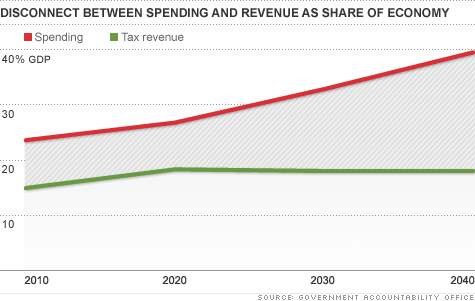Search News

NEW YORK (CNNMoney) -- Nobody likes having to pay more in taxes. And it's true that the country is on track to spend more than it can afford.
So why can't Congress just cut spending to put the federal budget on a more sustainable path?
First answer: The problem is too deep to fix with spending cuts alone.
Here's just how deep: Say lawmakers wanted to permanently freeze the national debt held by the public where it is today -- 67% of GDP. They would need to cut spending by 35%, or about $1.2 trillion, immediately. And those cuts would need to be permanent, according to the Government Accountability Office.
How hard would that be? Consider that in 2010, all of discretionary spending -- including defense -- totaled $1.4 trillion.
Even permanently cutting $1.2 trillion wouldn't be the end of the story. Public debt at 67% is still well above the country's four-decade historical average of 37%. So more cutting would need to occur in subsequent decades.
What's more, even if it were feasible to focus only on the spending side of the ledger, the truth is a lot of spending can't be turned off quickly.
Changes to Medicare and Social Security benefits, for instance, would need to be phased in over time so future retirees can adjust their plans.
And curbing rising medical costs will take years since it's still not clear what will be most effective in tamping down health care cost inflation.
"Finding a way to bring in some revenue is a crucial piece of the puzzle to lower deficits in the medium term [10 years], because there is only so much spending that can be cut over a ten-year time period," wrote Diane Rogers, chief economist of the Concord Coalition, in the deficit watchdog group's blog.
At the same time, economists have warned against cutting spending and raising taxes abruptly because the economy is still fragile. That's why fiscal experts recommend a two-pronged approach: pair policies that support near-term recovery with a long-term debt reduction plan that will kick in when the economy is stronger.
Second answer: The country doesn't just have a spending problem
The country has continually spent more than it has been willing to collect in taxes. Over the past four decades, tax revenue has averaged 18% of GDP -- while spending has averaged 21%.
Today, the gap is much wider since revenue is at a 60-year low and spending at a 60-year high.
Thank you, economic downturn.
But even after the economy recovers, if current policies -- including pricey tax cuts -- remain in place, the gap is projected to grow at an accelerated pace because of retiree and health care costs.
"Baby Boomers are aging and there are a lot of benefits we provide for people 65 and older. Even if we could slow the growth in health care costs to the rate of GDP, demographics alone would push up government spending," said tax expert Len Burman, a professor of public policy at Syracuse University.
So does the country have a spending problem or a revenue problem? In truth, it's both. (Obama's deficit problem: His tax cuts)
"Everybody would like low taxes. And they'd like government to do everything that they think government should do. But the arithmetic can be a problem," said Susan Irving, director of federal budget analysis at the Government Accountability Office.
In other words, there is a major disconnect between the programs people want and what they're willing to pay for them. Reducing the debt will involve fixing that disconnect or at least narrowing it considerably.
Of course, Congress doesn't have to hike tax rates in order to raise more revenue. In fact, fiscal experts would prefer that lawmakers lower rates while eliminating or reducing the hundreds of tax credits, deductions and exemptions on the books. Such "tax expenditures" deprive federal coffers of more than $1 trillion a year.
Tax breaks are geared to benefit specific groups and encourage specific economic activities. But they also contribute to the complexity of the tax code and the sense that the code is unfair.
By reducing tax breaks, but especially by closing tax loopholes that let taxpayers legally get around being taxed on certain activities, "you remove the opportunity for inefficient tax avoidance," said Burman.
That is, people will spend less time diverting their money into tax-favored activities and instead they'll put it where it makes the best economic sense. And that, in turn, may help the economy grow. ![]()
| Overnight Avg Rate | Latest | Change | Last Week |
|---|---|---|---|
| 30 yr fixed | 3.80% | 3.88% | |
| 15 yr fixed | 3.20% | 3.23% | |
| 5/1 ARM | 3.84% | 3.88% | |
| 30 yr refi | 3.82% | 3.93% | |
| 15 yr refi | 3.20% | 3.23% |
Today's featured rates:
| Latest Report | Next Update |
|---|---|
| Home prices | Aug 28 |
| Consumer confidence | Aug 28 |
| GDP | Aug 29 |
| Manufacturing (ISM) | Sept 4 |
| Jobs | Sept 7 |
| Inflation (CPI) | Sept 14 |
| Retail sales | Sept 14 |